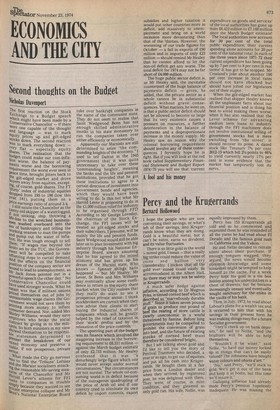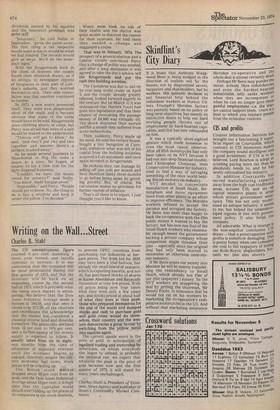A fool and his money
Percy and the Krugerrands
Bernard Hollowood
I hope the people who are now converting their savings, or what's left of their savings, into Krugerrands know what they are doing. Gold is a beautiful metal, but it can't be eaten, earns no dividend, and its value fluctuates.
There is so little gold in the world —mined gold, I mean — that a really big strike could reduce the value of coins and bullion very considerably. I reckon that all the gold ever mined could easily be accommodated in the Albert Hall. So there may or may not be safety in Krugerrands.
A much safer hedge against inflation, according to Dr Magnus Pyke, is tinned corned beef which is described as "marvellously durable stuff." Since it takes seven pounds of grain to produce one pound of beef the rearing of store cattle is clearly uneconomic in a world threatened by famine. Before long governments may be compelled to prohibit the conversion of grain into beef, and the future of existing stocks of corned beef must therefore be considered bright.
But I am talking about gold and I'd like to tell you the story of Percival Tranmere who decided, a year or so ago, to get out of equities and put all his cash into Krugerrands. He bought them at a fair price from a London dealer and when they arrived, by registered
p,
ost he was delighted with them. They were, of course, in mint condition, and they gleamed as only gold can. His wife, Nellie, was equally impressed by them.
Percy has 153 Krugerrands all told and as he commented and examined them he was reminded of all the yarns he had read about El Dorado and the famous gold rush to California and the Yukon.
He and Nellie decided to remain silent about their purchase. If enough tongues wagged, they argued, the news would become common knowledge and some scoundrel might be tempted to help himself to the cache.. For a week Percy kept his gold in a tin box hidden among his underclothes in a chest of drawers, but he became increasingly uneasy and eventually sought sanctuary for the coins in the vaults of his bank.
Then, in July, 1972, he read about Labour's plans for a wealth tax and it occurred to him that with his savings in their present form he was making things easy for a future Socialist government.
-They'll check up on bank deposits," he said to Nellie, "and the blighters will be able to help
themselves. •
"Wouldn't it be wiser," said Nellie, "to have our money locked up in things that can't be easily valued? The Johnsons have bought water colours and objets d'art."
"No," said Percy, "we'll stick to gold. We'll get it out of the bank and keep it at home, but this time we'll insure it."
Galloping inflation had already made Percy's pension hopelessly inadequate. He was missing the dividends earned by his equities and the insurance premium was quite stiff.
"Insurance," he told Nellie in September, "gives the game away. The first thing a tax inspector would want to know would be what we had insured. The records would give us away. We'll let the insurance lapse."
With the Krugerrands back in the chest of drawers the couple found their attention drawn, as if on strings, to newspaper reports of burglaries in their part of London's suburbs, and they worried themSelves sick. Their only consolation was that equities continued to tumble.
In 1973, a new worry presented itself. They were now desperately short of the ready and it became obvious that some of the coins would have to be sold. Krugerrands were climbing slowly in value, but Percy was afraid that news of a sale would be leaked to the underworld.
"Thieves will get to know," he said, "and they'll put two and two together and assume there's a jackpot stashed away." So he made several journeys to Manchester to flog the coins a dozen at atime. He hoped, of course, to lay a false trail for the light-fingered fraternity. "Couldn't we have • the house wired for security?" said Nellie. "You know, made burglar-proof."
"Impossible," said Percy. "People would get to know. No, the thing to do is buy a revolver and keep it under the pillow. I've decided." Worry soon took its toll of their health and the doctor was quite unable to discover the reason for their neuroses. He told them they needed a change and suggested a cruise.
That was in January, 1974. The prospect of a general election and a Labour victory convinced Percy that a change of policy was needed, and after a long discussion it was agreed to take the doe's advice, sell the Krugerrands and put the cash into building societies.
The Cantahria was due to sail on its year-long world cruise on April 5, and the couple, already greatly relieved, looked forward eagerly to the venture. But on March 31 it was announced that Hatters Tours had gone into liquidation and that their chance of recovering the passage money of £4,800 was virtually nil. The shock shattered their morale and for a month they suffered from acute melancholia.
Then, suddenly, Percy made up his mind. He sold the terrace house, bought a tiny bungalow in Cornwall, withdrew what was left of his capital from the building societies, acquired a Colt automatic and once again invested in Krugerrands.
He reckons they can manage by selling off one coin per month and have therefore thirty-three months to go before being upset by grinding poverty. But, of course, his calculation makes no provision for further rounds of inflation.
That's all there is to report. I just thought you'd like to know.



































 Previous page
Previous page